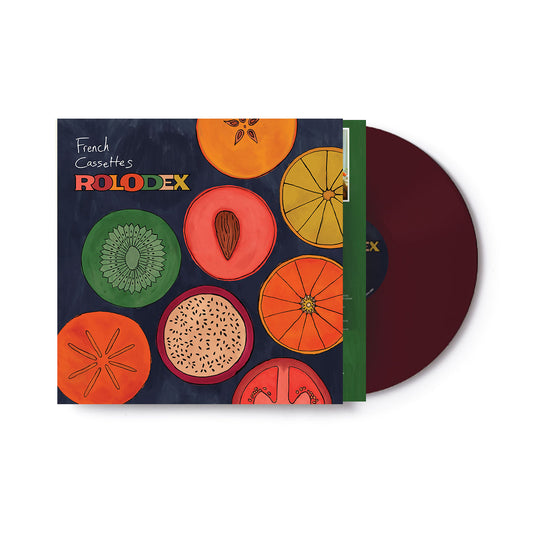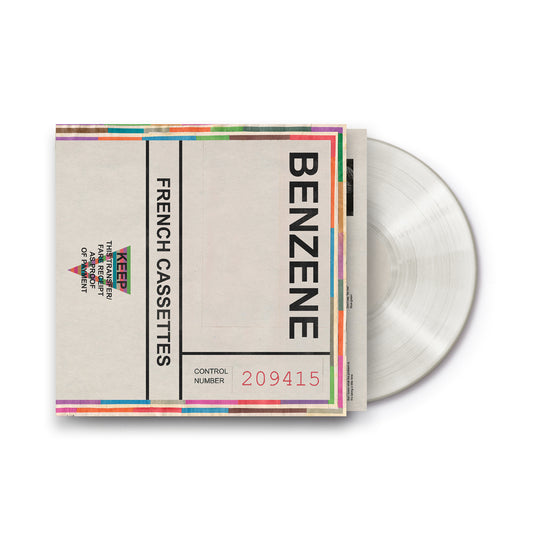Benzene means nothing and everything. The title of French Cassettes’ new album is not an allusion to the dangerous fossil fuel byproduct, nor is it a nod to the anti-anxiety drug Benzos. As a child, Scott Huerta’s birth name—Lorenzo—transformed into Wren, then Renzo. Before long, he was Renzo Benzo. By the age of four, the family had largely settled on Benz, which is what they still call him today.
Benzene, Huerta’s own abstraction, was chosen on...
Benzene means nothing and everything. The title of French Cassettes’ new album is not an allusion to the dangerous fossil fuel byproduct, nor is it a nod to the anti-anxiety drug Benzos. As a child, Scott Huerta’s birth name—Lorenzo—transformed into Wren, then Renzo. Before long, he was Renzo Benzo. By the age of four, the family had largely settled on Benz, which is what they still call him today.
Benzene, Huerta’s own abstraction, was chosen on a whim. “I wish I had a better explanation,” he admits. “I guess I should have Googled it first.” The self-deprecation is classic Benz, as is this crossing of the wires between the flippant and the deeply meaningful. There’s a lot in a name, after all, and even more in a name that only those dearest to you call you by.
This sort of understatement is all over Benzene (the album), in big ways and small ones. It’s one reason the San Francisco band’s third album holds up so well to repeated listens: It contains a world of references, quotes and handmade word-puzzles that only Huerta can fully unpack. Some of the band’s influences are apparent: The Magnetic Fields in the tight song construction and humor, The Beach Boys in the harmonies and experimentation. But Huerta’s lyrical aesthetic is his own, and Benzene is packed to the gills with funny, memorable one-liners (“I’m sick of bar banter, but attracted to the neon”) and punctuated by knife twists (“Sometimes you swear you barely know her”). Its themes never veer too far from separation: from partners you still want the best for; from family members who have died; from a person you’re trying hard not to be.
Maybe letting go was an unavoidable subject. French Cassettes’ last album, Rolodex, was a painstaking six years in the making. Perfectionist tendencies, anxiety and grief all played roles in the delay. In 2019, though, the band signed with a new record label (Tender Loving Empire, which is also releasing Benzene) and prepared themselves for a release date and extensive touring—just as the reality of Covid set in. The band’s sophomore record would eventually drop in December of 2020, in the thick of lockdowns and uncertainty. The response, though, was heartening. Rolodex performed well and found its way into the ears of new fans, some of whom wrote the band to let them know how much the album’s harmony-fueled, tightly woven mix of bittersweet and upbeat affected them in a difficult time. When the band finally did tour, many of the shows were sold-out. “We didn’t know what to expect, exactly,” Huerta says. “But it was still incredibly surprising and touching.”
Huerta was already working on the songs that would become Benzene during Rolodex’s release. He wrote and recorded songs in the bedroom while his then-girlfriend worked from home in the next room. “Sometimes I’d get a good take and then realize that the theme from Love Island was playing in the background,” Huerta says. His memories of this time are all positive, but the recording process would eventually outlast the romantic relationship.
Huerta and French Cassettes cofounder Mackenzie Bunch, who started the band in High School back in Ripon, California before moving to San Francisco, brought the songs into Bunch’s Oakland studio in 2021. Determined to not spend another six years making Rolodex’s follow-up, the pair—with Bunch sharing guitar duties and playing bass alongside new drummer Rob Mills—let their proverbial hair down. “It’s supposed to be fun,” Huerta says. “And when your bandmates are as good as mine, it really is fun.”
While the album still took three years from start to finish, Benzene does bear evidence of a French Cassettes that seems more comfortable taking risks and taking it easy. The intricate guitar work on “Medium Horny” is a holdover from the demo version, and that re-potting gives it a delicate, almost antique feel. “When You Know You Know” allows itself to settle into a comfortable, soulful groove that continues into the even chiller “Megabus,” a song with a smooth lilting melody and Nashville-tight rhythm section. All of this sets the stage for the even more R&B-forward—and not altogether un-sexy, despite including the line “I can hardly treat my body right”—“Finally,” a song that Huerta admits he’s still a little nervous to let loose into the world.
“Normal Day,” with its crunchy, breakbeat-style drums and woozy Mellotron, is the band at its most carnivalesque. It finds Huerta cracking up mid-line as he talk-sings about facing rejection during an attempted Goodwill donation. The song stops completely so he can let out a pained scream, and wandering keys return amidst bird sounds, as if being played from a passing Ice Cream truck.
Then there are songs that just do a little bit of everything: “White Noise,” a testament to Bunch’s knack for adventurous production. The song finds its warbling, dueling guitars competing with brutally oversaturated drums before exploding into cleaner rock pastures while Huerta sings about the intimate details of a voicemail message he’s grown obsessed with.
Bunch attributes the album’s wide spread of styles to the band’s meticulous working process: If a member of French Cassettes has an idea for a part or a recording technique, they try it out. Bunch and Huerta’s long friendship means “we can be honest with each other,” Bunch says, in winnowing their options down to a final result. This means there can be an element of collage to French Cassettes’ songs, but it’s all in service of finding something that feels honest and exciting. “Scott would send us a demo of something he recorded in his closet,” drummer Rob Mills says. “And it would have that new-song energy. We always try to find ways to recapture that.”
Lyrically and musically, the songs on Benzene are in constant motion: The band never misses an opportunity to do something interesting. Melodically, production-wise, lyrically. There's always room to add another hook, or a new harmony, a strange sound, or a little secret handshake of a lyric. It’s that search for authentic energy that makes it all feel cohesive. The boys of French Cassettes follow their instincts to all destinations earnest, funny, joyful and heartbreaking with no regard for genre or posturing, making it feel like a new listen every time. The band’s confidence—which is very apparent on their third album—seems less important than their trust.
That trust is particularly evident on the album’s closer, “Up To You,” which hosts some of Benzene’s most inscrutable and engaging moments before wrapping up with twenty-one words on a very familiar subject: Huerta’s grandmother. It stems from a memory of the notes she’d leave Scott and his brother Thomas on their shared family computer. Over swirling guitars and a drunken piano walk that ascends as the vocals climb downward, Huerta sings lines about William H. Macy and growing up in the suburbs. Like much of Benzene, it’s funny… until it hurts.
“My mother’s mother types in Comic Sans,” he sings. “I will never not love her. I wish there were more emails to read.”
Read less-
 Sold out
Sold outFrench Cassettes - Rolodex
Vendor:TLE MusicRegular price From $8.00Regular priceUnit price per$8.00Sale price From $8.00Sold out -
(Pre-order) French Cassettes - Benzene
Vendor:French CassettesRegular price $25.00Regular priceUnit price per




